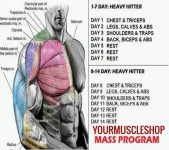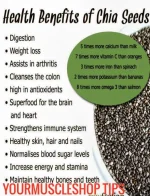Here’s How Much Protein You Need in a Day to Build Muscle
How much protein you need to build muscle can depend on your weight, activity level, and age. Eating too much may have some risks.
Protein is essential for building muscle, but health experts warn eating too much can pose health risks.
The current recommended dietary allowance (RDA) is 0.8 grams of protein per kilogram of body weight.
Endurance or strength athletes should take 1.2 to 2 grams of protein per kilogram of body weight daily.
Protein may be a buzzword in wellness and bodybuilding, but it’s also essential. So, in some ways, one nutrition expert doesn’t mind that people are paying attention to grams of protein on nutrition labels.
“Protein is the building block for muscles,” said Anupama Chawla, MD, a pediatric gastroenterologist at at Stony Brook Medicine.
Indeed, research from 2018Trusted Source indicates that muscle protein breaks down in the human body. Consuming more protein is essential to rebuilding — and even building more — muscle.
As you might expect, consuming adequate protein in conjunction with strength training helps you build muscle. And that’s part of the reason why people are honing in on this nutrient when purchasing food.
“It has become a fad because of the significant [focus] on weight loss and muscle building,” Chawla told Healthline. “It’s become an ‘in thing’ where everybody is reading the protein content.”
But pump the breaks before pouring an entire tub of protein powder into tomorrow morning’s breakfast smoothie. Experts and research indicate that there is such a thing as too much protein.
Though Chawla is glad protein is getting attention because of its importance to the human diet, she cautioned against going to extremes, such as consuming an all-meat diet. “Too little is not good, and too much is not good,” Chawla said.
How much should you be consuming? That depends. Here’s what the research, health experts, and guidelines say.
How much protein do I need?
The minimum recommended dietary allowance (RDA) for protein is 0.8 grams of proteinTrusted Source per kilogram of body weight per day. Most people actually need more, especially those who exercise regularly. This means how much protein you should eat daily varies from person to person.
“A person weighing 140 pounds needs [at least] 51 grams of protein per day, and another person weighing 200 pounds needs [at least] 73 grams of protein per day,” Dana Ellis Hunnes, PhD, a senior dietitian with UCLA Medical Center, told Healthline.
Trista Best, a registered dietitian at Balance One Supplements, adds that this number equates to about 10 to 35% of our daily recommended caloric intake.
How much protein you need varies by age
But, as with many aspects of medicine, there’s room for nuance. For example, age is one reason to up the protein intake.
“Older adults [around ages 65 to 70] should eat a little more, roughly 1 gram per kilogram or -.45 gram per pound of body weight because they don’t absorb quite as well and are more prone to muscle loss and bone fractures,” Hunnes said.
Physical activity may affect protein intake
Some athletes also may require more to support their training regimen and physical activity.
A 2016 position statement from the Academy of Nutrition and Dietetics, Dietitians of Canada, and the American College of Sports Medicine recommended the following guidelines for protein intake among physically active individuals:
Physically active people take in 1.2 to 2 grams of protein per kilogram of body weight or 0.5 to 0.9 grams per pound of body weight, whether they are endurance or strength athletes.
Whether protein is consumed on the high or low end of these recommended amounts should be based on intensity of exercise or calorie restriction.
Athletes should consume 0.25 to 0.3 grams of protein per kilogram of body weight no more than two hours post-exercise to increase muscle.
How much protein is too much?
Hunnes recommended consuming no more than 1.3 grams of protein per kilogram of body weight daily.
When you consume more protein than needed, your body may store the excess calories as fat.
Rose-Francis noted that consuming too much protein — over 2 grams per kilogram of body weight daily — may come with risks, such as un unwanted weight gain.
In addition, people living with or at risk for kidney disease may also experience azotemia (kidney malfunction).
A 2020 studyTrusted Source indicates that high protein diets did not increase kidney or bone health risks but called for longer clinical trials.
However, as Rose-Francis pointed out, a high protein diet was classified as 1.07–1.60 grams of protein per kilogram of body weight, not 2 grams.
Does protein intake affect muscle mass?
A 2022 meta-analysis of 69 studies suggested sticking to the lower end of the position statement’s recommendations.
Based on previous research, authors indicated that eating 1.5 grams of protein per kilogram of body weight, which equates to 0.7 grams of protein per pound, should be enough to build strength when combined with resistance training. The point about resistance training is a reminder that muscle mass is not simply a product of protein intake.
“If someone wants to build more muscle, they need to up the intensity of their strength training — higher weights, higher reps, or both — and break down their muscle fibers. Then, they need to eat a healthy diet,” Hunnes said.
Another 2022 studyTrusted Source of more than 4,800 Chinese individuals 60 and older suggested that male participants who consumed more than 78 grams per day and females who consumed 68 grams daily had the most protection against low muscle mass.
They consumed less than 20 grams of protein per meal, and the majority of protein came from plant-based sources.
In addition, a 2022 systematic review and meta-analysisTrusted Source of protein intake in healthy adults suggested that 1.6 grams of protein per kilogram of body weight per day could help individuals under 45 years old increase body mass slightly. People older than 45 only saw marginal increases.
A 2020 systemic review and meta-analysis of previous randomized control trials indicated that upping daily protein intake by up to 3.5 grams per kilogram of body weight over the course of several meals could help people grow or maintain muscle mass.
What happens when you don’t eat enough protein?
Even in developed countries like the United States, research suggests that many people are still not getting enough protein.
Inadequate protein intake decreases muscle mass and strength. According to Rose-Francis, other signs of protein deficiency may include:
weakened immune system
malnutrition
edema due to fluid imbalance
hair thinning
And don't forget to add in your Bodybuilding and Fitness Supplements from YourMuscleShop.
Don't forget to use my exclusive Discount Code PEP20 to save 20% off your total order at checkout.
Shop Now :
Home - Yourmuscleshop
Contact Us :
Telegram:
Telegram: Contact @yourmuscleshopofficial
Whats app : +1 424-297-6166
Email :
yourmuscleshopsales1@protonmail.com
www.yourbodybuildingstore.to
www.yourmuscleshop.org
www.yourmuscleshop.store
www.yourmuscleshop.shop





















